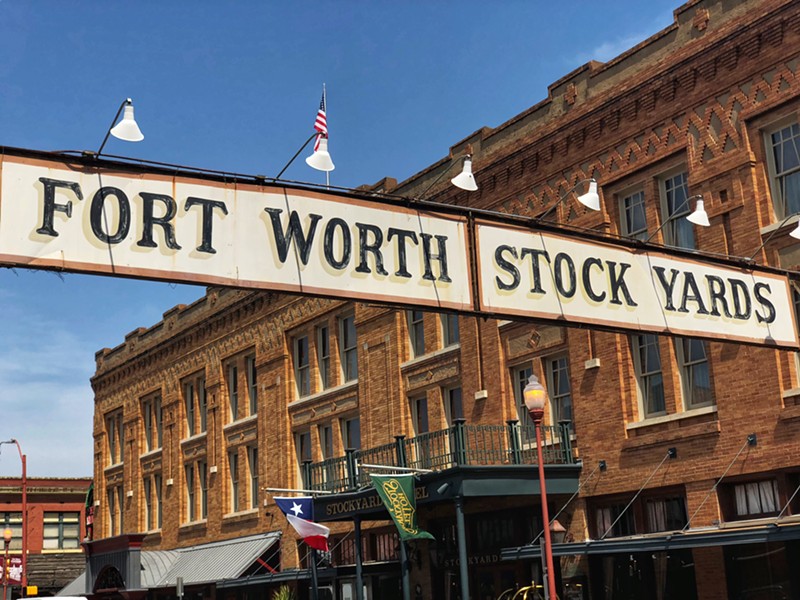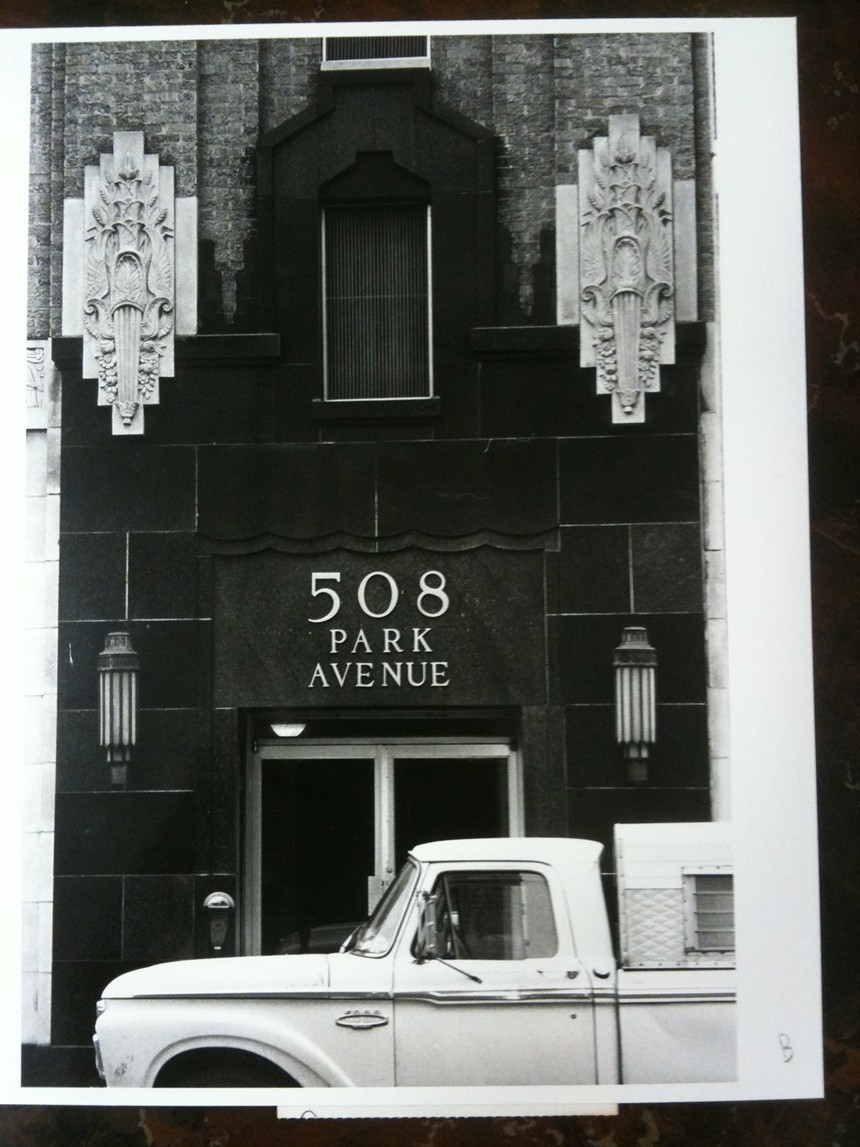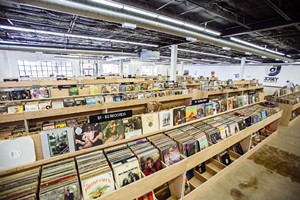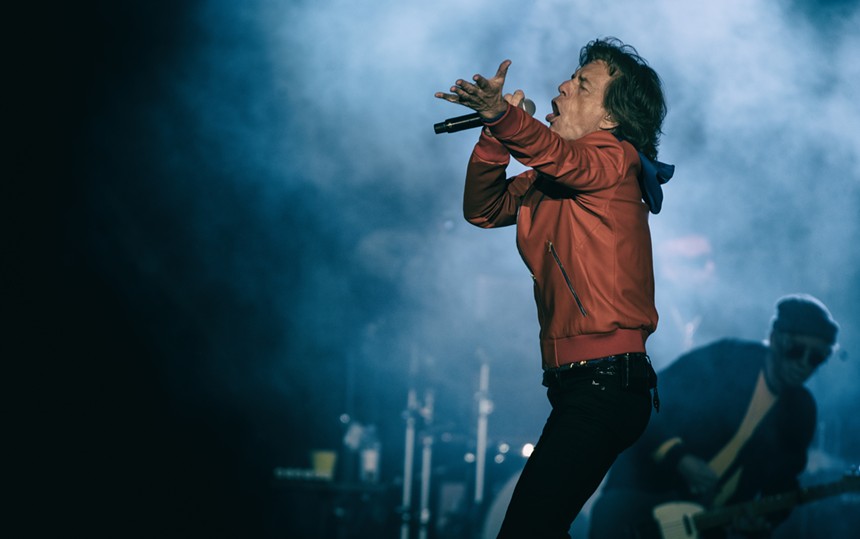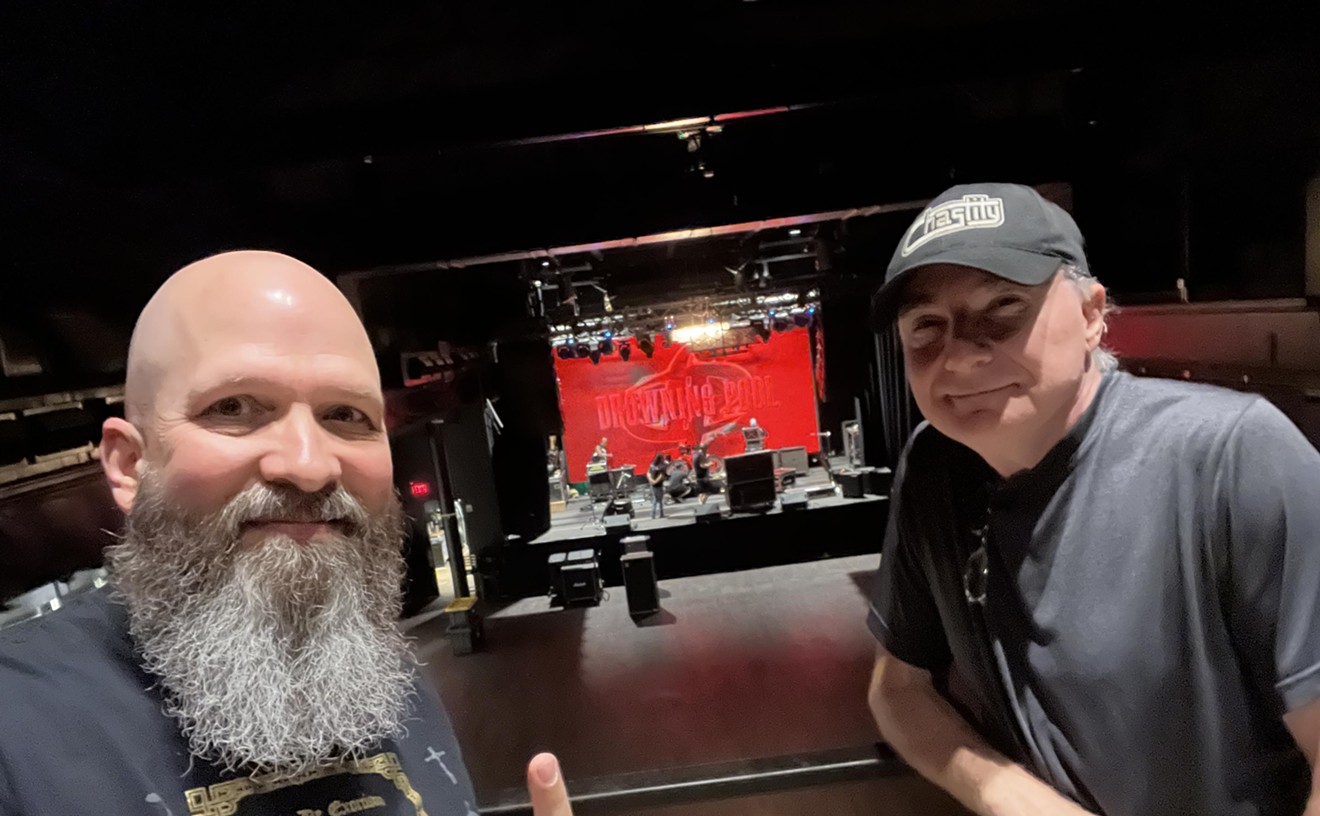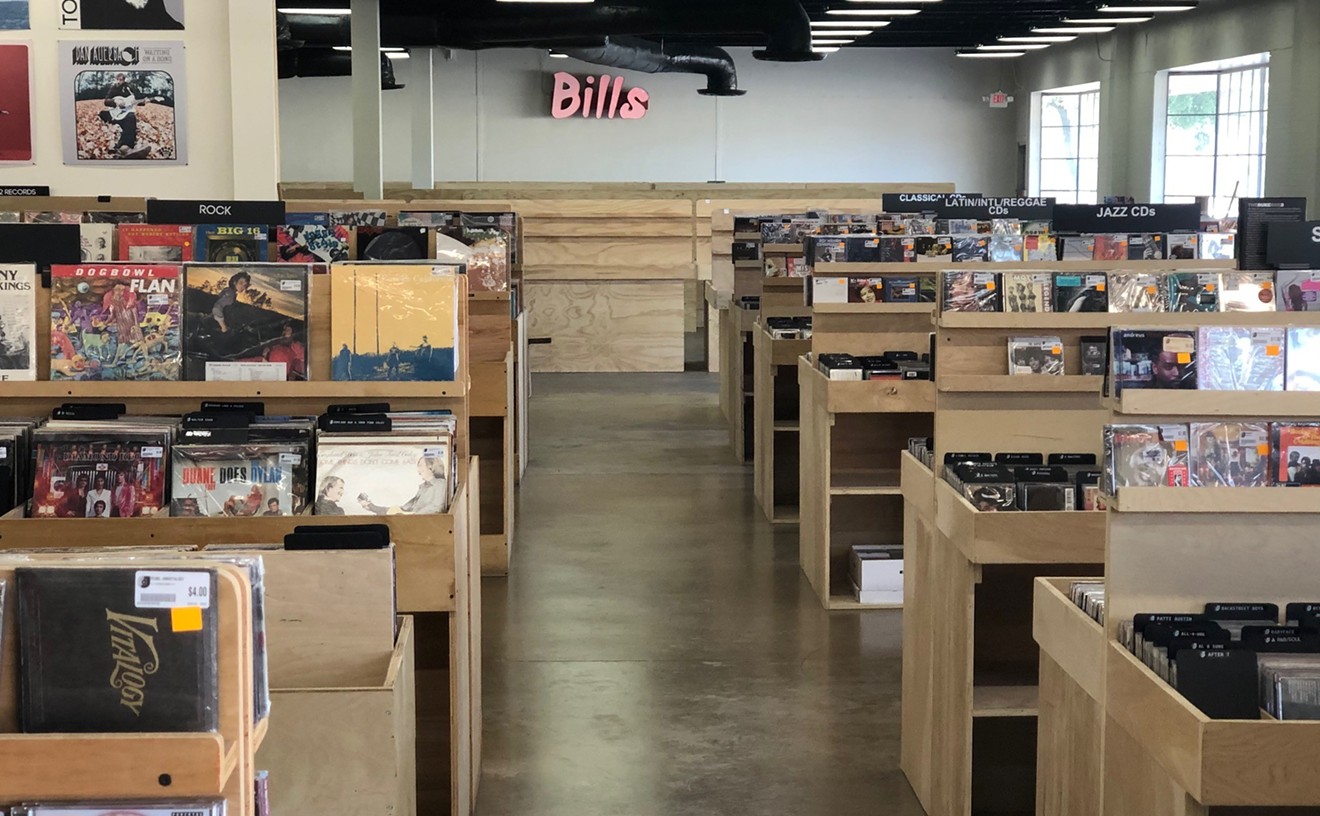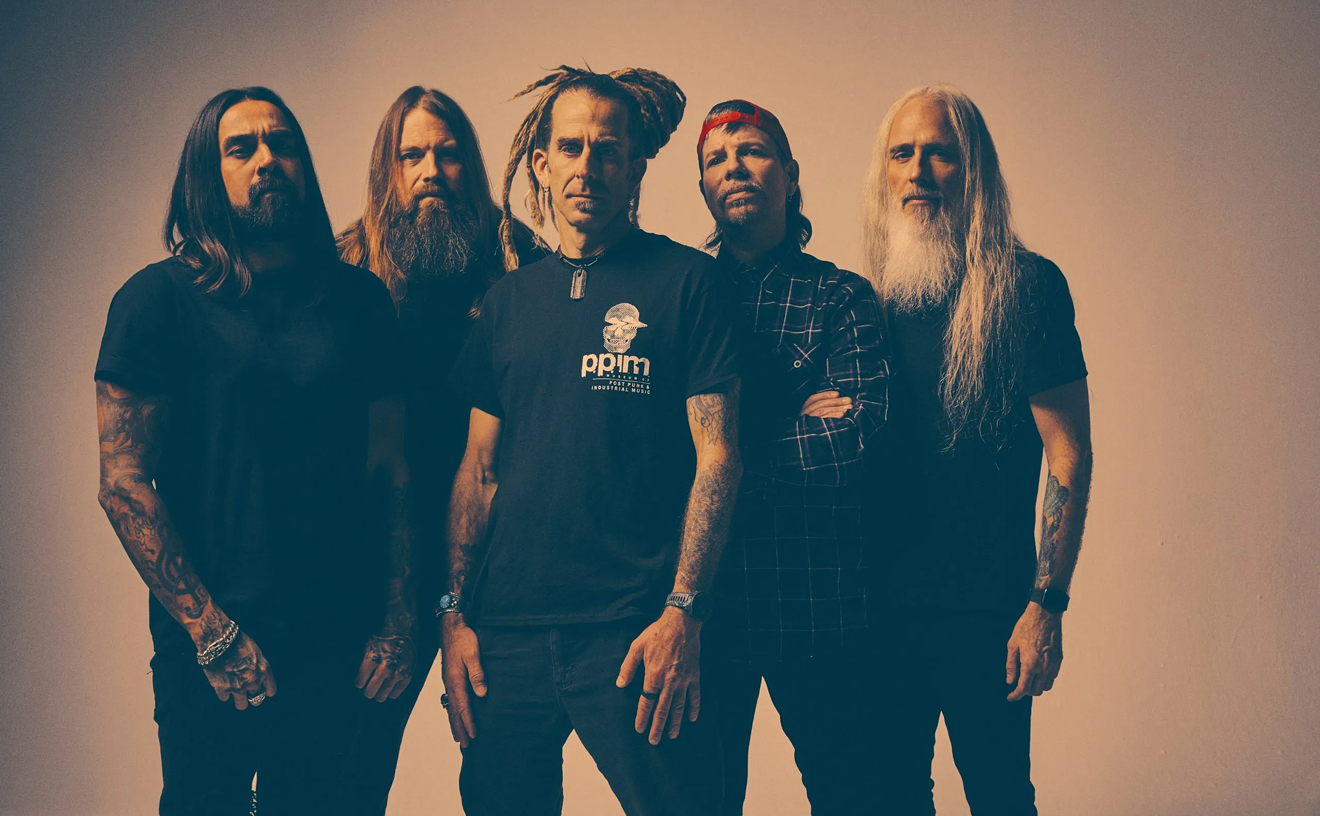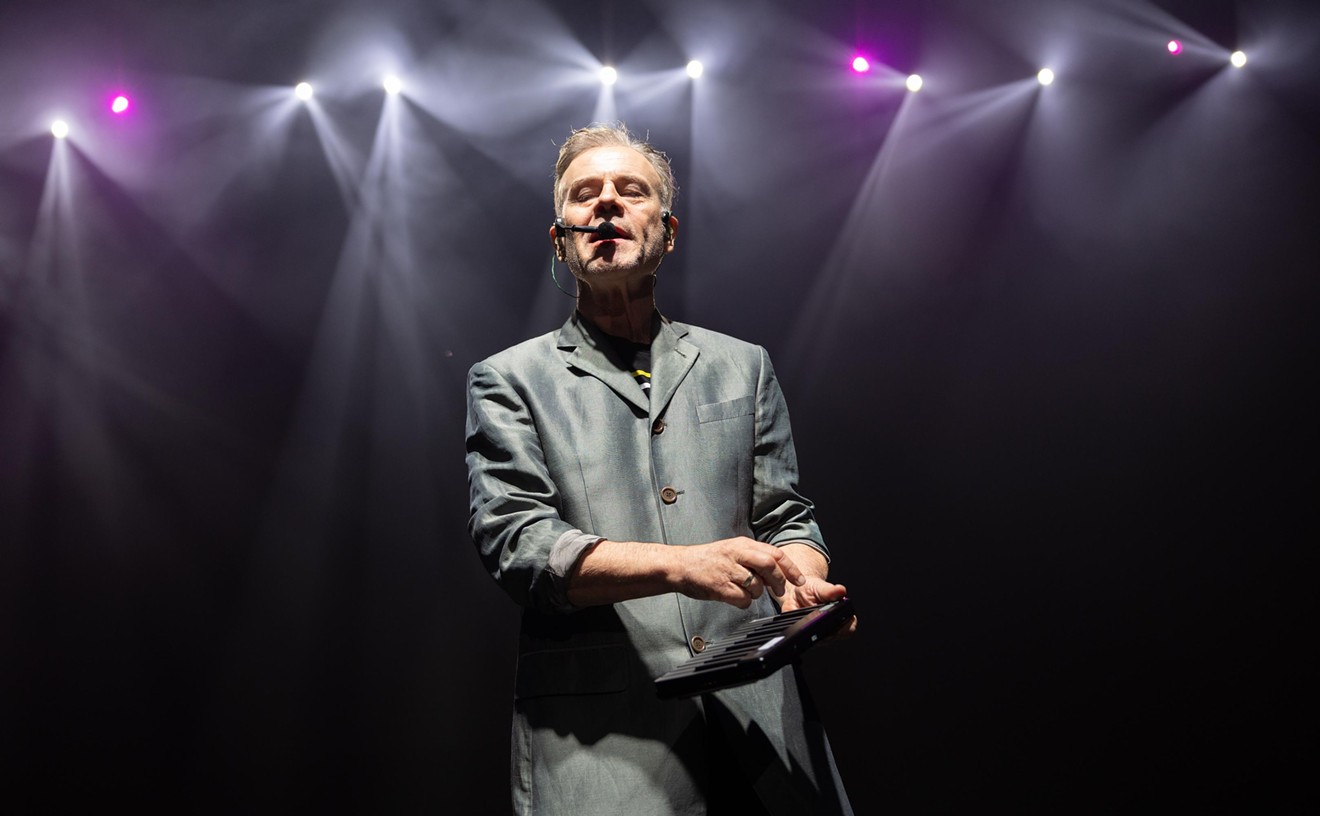Granted, it takes a little bit of legwork, some imagination and a willingness to make the leap between what came before and what is accessible in the here and now. Many of the landmark sites where not only local music, but global music, history was made are now only memories.
For those who want to understand the long tail and enduring impact of North Texas music history, here are 50 spots, in no particular order, to check out. Consider this less a definitive accounting and more of a starting point for your own personal explorations and appreciations of the moments large and small that continue to reverberate around North Texas and beyond.
Deep Ellum Community Center
2528 Elm St.This nerve center of creativity opened last September and serves as a hub for the history of the Deep Ellum neighborhood, cradling 150 years’ worth of legacy and serving as a waypoint for what’s next: an operational 78 rpm recording studio is on site, as is a listening room.
Tina Turner and the Lorenzo Hotel
1011 S. Akard St.On July 3, 1976, R&B superstar Tina Turner fled her abusive marriage to then-husband Ike Turner, scrambling across Interstate 30 from the Statler Hotel to what was then a Ramada Inn. Now, it’s the Lorenzo Hotel, and a portrait of Tina Turner hangs in its lobby, commemorating the star, who died in 2023 at the age of 83.
Former Home of Ray Charles
2642 Eugene St.It’s a simple, unpretentious cottage where, beginning in 1955, an R&B icon lived with his then-wife Della Beatrice Howard and their newborn son, Ray Jr., for three years. Shockingly, the house remains unprotected by any kind of landmark status, either by the city of Dallas or any entity outside the state.
Longhorn Ballroom
216 Corinth St.Mercifully rescued from neglect by Edwin Cabaniss and his band of preservationists, the Longhorn was built in 1950 for Western swing titan Bob Wills. Today, it honors the past (via its handsomely mounted shadow boxes of memorabilia) as it welcomes the present (acts like Rhiannon Giddens and Slowdive have appeared in the past months). Few other venues in town can lay claim to Nat King Cole, the Sex Pistols and Merle Haggard all having graced their stage.
508 Park
508 Park Ave.This Art Deco masterpiece was once the Warner Brothers Exchange Building, a hub for film and record distribution. In 1937, producer Don Law cobbled together a recording studio, where blues legend Robert Johnson cut 13 tracks, preserving much of his known catalog for posterity.
Deep Ellum Blues Alley
2713 Canton St.Tucked away in Deep Ellum is a fantastic fusion of old and new — Deep Ellum Blues Alley, an ongoing mural project curated by local artists Dan and Cathryn Colcer. It depicts locally bred greats like Freddie King, Blind Lemon Jefferson and T-Bone Walker, as realized by North Texas artists such as Frank Campagna, Hatziel Flores and Ebony Lewis.
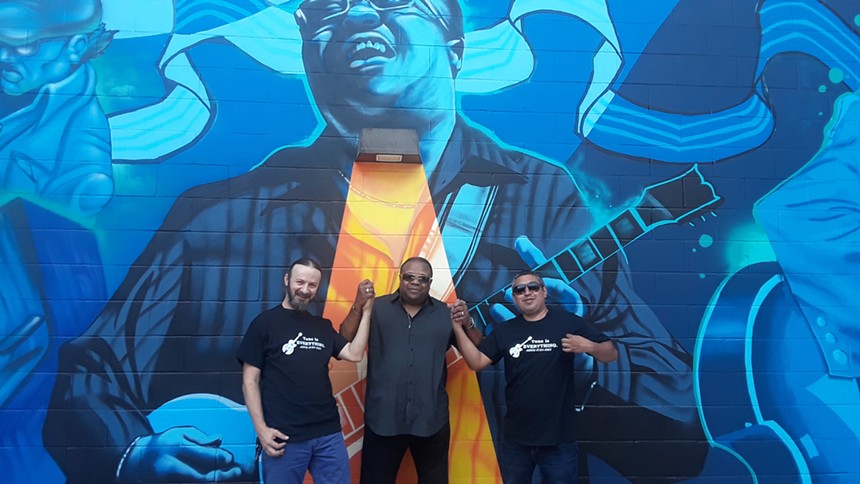
From left: Dan Colcer, artist Hatziel Flores and musician Andrew Jr. Boy Jones, in front of a mural belonging to Blues Alley, one of the best spots to learn about local music.
Cathryn Colcer
Stevie Ray Vaughan Park
4334 W. Jefferson Blvd.The pride of Oak Cliff, singer-songwriter and guitarist Stevie Ray Vaughan stands alone among North Texas music legends. He’s the only one with a park named in his honor (anywhere in the state, for that matter). Opened in April 2023 at an event attended by Vaughan’s brother Jimmie, the park features a stage as well as a mural showing the brothers through the years.
Top Ten Records
338 Jefferson Blvd.There is no shortage of record stores in North Texas, but only one can lay claim to being the oldest. Top Ten Records opened its doors in 1956 and has endured over the decades, thanks in part to the passionate community it both supports and engenders. In 2017, Top Ten Records shifted to a nonprofit model, becoming a 501(c)3 dedicated to creating a space for the arts and civic engagement.
Trees
2709 Elm St.Any music venue that can endure for more than three decades is bound to have a memorable night or two in its past, and for Deep Ellum mainstay Trees, few nights are as vividly recalled as Oct. 19, 1991. That's when Nirvana, on the cusp of superstardom, played a sold-out show that devolved into complete chaos (long story very short: Kurt Cobain got into a bloody fight with a security guard). Trees closed in 1999 but reopened in 2015.
Billy Bob’s Texas
2520 Rodeo Plaza, Fort WorthName any country legend you can think of — go ahead, we’ll wait — and odds are very good they have played Billy Bob’s Texas at least once, if not multiple times. (Willie Nelson has appeared there more than 50 times.) The weight of history is palpable the moment you step through the doors of this storied honky-tonk in the Fort Worth Stockyards — handprints of the famous names who’ve sung under the spotlights dot the walls en route to the showroom, where icons’ names adorn the barroom walls in neon lights.
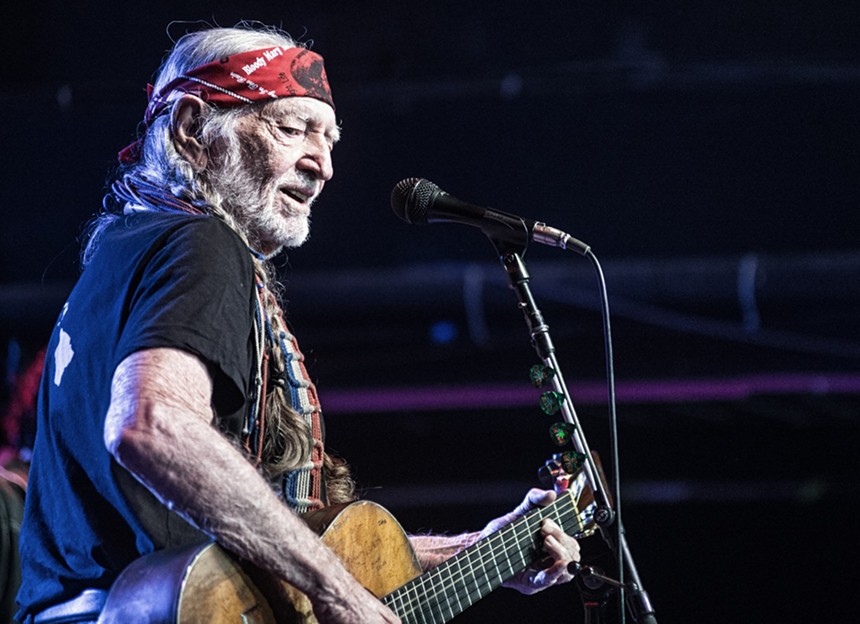
Willie Nelson playing at Billy Bob's Texas in Fort Worth, a frequent tour spot for the country icon.
Mike Brooks
Will Rogers Auditorium
3401 W. Lancaster Ave., Fort WorthAlthough these days this Art Deco gem tucked into Fort Worth’s Cultural District is more closely associated with the city’s annual Stock Show and Rodeo, this 2,800-seat theater has played host to some of music’s biggest acts: Jimi Hendrix, Genesis and the Kinks, among others, have performed there over the years.
McFarlin Memorial Auditorium
6405 Boaz LaneThis 2,300-capacity space on the Southern Methodist University campus is more often used for lecture or academic ceremonies these days, but McFarlin Memorial Auditorium still plays host — as it has throughout its 98-year existence — to live music. Acts like The Doors, Blondie, REM, The Kinks, Sheryl Crow and Yo-Yo Ma have appeared on the venue’s stage.
Boyd Hotel
2934 Elm St.One of the oldest standing hotels in the city, this 1911 building hosted many of the blues legends who passed through the city and the Deep Ellum neighborhood in the 1920s and 1930s, including Huddie “Leadbelly” Ledbetter, Blind Lemon Jefferson and Bill Neely. The hotel is a designated Dallas landmark and was preserved as such in 1996.
Kessler Theater
1230 W. Davis St.Another venue rescued from oblivion by Edwin Cabaniss, the Kessler Theater, opened its doors in 1942 before being taken over by Gene Autry in 1947 (and ultimately closing in 1960, after tornado damage in 1957). It languished until 2010, when under Cabaniss’ restorative care, it reopened and has welcomed a host of artists the likes of St. Vincent and Ben Folds to its intimate stage ever since.
Fort Worth Convention Center
1201 Houston St., Fort WorthThis space-age-looking edifice in downtown Fort Worth opened to the public in 1968 and wasted little time attracting some of music’s biggest names: Elvis Presley, the Rolling Stones, Bob Dylan, Paul McCartney, Pink Floyd, Led Zeppelin, Bob Marley and the Wailers, U2 and Metallica are just a few of the A-list acts to play the 13,500-capacity space over the decades.
Booker T. Washington High School for the Performing and Visual Arts
2501 Flora St.It might be faster to list the homegrown talent that hasn’t passed through this school’s hallowed halls. Edie Brickell, Norah Jones, Erykah Badu, Roy Hargrove, Shaun Martin and Marc Rebillet are some of the now-famous names populating the alumni roster of the Dallas landmark, which opened in 1892 as the Dallas Colored High School. It moved to its current location and was renamed Booker T. Washington High School in 1922.
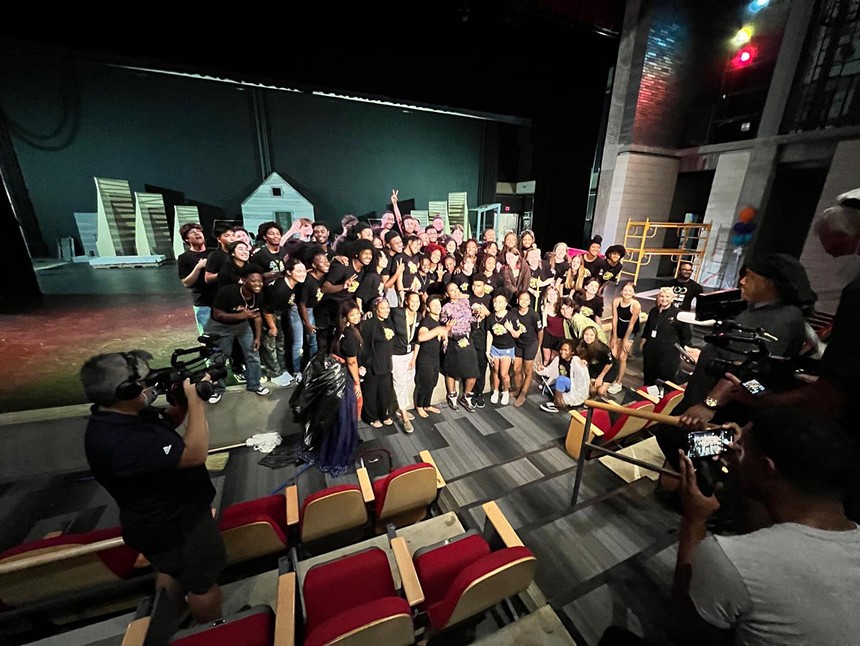
Actress and singer Jennifer Hudson surprised students at Booker T. Washington High School for the Performing and Visual Arts, as have Erykah Badu and Common.
Courtesy of Booker T. Washington High School for the Performing and Visual Arts
Caravan of Dreams
301 Houston St., Fort WorthIn September 1983, a progressive vision of creative utopia, unlike anything before it, materialized in downtown Fort Worth. The performing arts space Caravan of Dreams opened to the public with a performance from native son Ornette Coleman (these concerts would be Coleman’s final appearance in Fort Worth before his death in 2015 at the age of 85). Denton’s Brave Combo presided over the closing night performance in 2001, 18 years to the day after it opened. Reata Restaurant and Four Day Weekend’s permanent theater now share the space.
Bass Performance Hall
525 Commerce St., Fort WorthOpened in 1998, this 2,000-capacity jewel of a venue is a Fort Worth treasure, and home base for multiple arts organizations, including the Fort Worth Symphony Orchestra, Texas Ballet Theater and Fort Worth Opera. Every four years, it's the site of the Van Cliburn International Piano Competition. Amid all of that, the Hall also hosts musical artists from multiple genres: Rufus Wainwright, Lindsey Buckingham, Vince Gill, Kris Kristofferson and Loretta Lynn are just some of the artists who have played Bass Hall.
University of North Texas
1501 W. Chestnut St., DentonAs with Booker T. Washington High School, the University of North Texas is renowned for turning out high-profile alumni. Some of the musicians who’ve cut their teeth in the classrooms and clubs of Denton include Ray Wylie Hubbard, Norah Jones, Meat Loaf, Lecrae, Lyle Mays, Maren Morris, Tobe Nwigwe, Roy Orbison, Bobby Sessions and Gary Nicholson.
Niles City Sound
201 S. Calhoun St., Fort WorthIf you didn’t know where the Niles City Sound recording studio is, you’d probably pass right by it. An unassuming space tucked into Fort Worth’s bustling Near Southside neighborhood, this space, opened in 2014 by Josh Block, Chris Vivion and Austin Jenkins, famously played host to the recording of Leon Bridges’ major-label debut, Coming Home. In the years since, Niles City has been a go-to spot for those seeking inspiration and dedication to an old-school, analog way of working that frequently yields magic.
I.M. Terrell High School
1900 I.M. Terrell Way, Fort WorthOpened in 1882 in an era of formalized racial segregation, I.M. Terrell was Fort Worth’s first school intended only for Black students. It served as a focal point for some of the city’s jazz and R&B legends, including Ornette Coleman, “King” Curtis Ousley, Cornell Dupree, Dewey Redman and Ronald Shannon Jackson, all of whom studied under G.A. Baxter, a towering figure in the school’s history.
The Grave of Townes Van Zandt
Dido Cemetery, 12341 Morris Dido Newark Road, Fort WorthNearly three decades have passed since legendary singer-songwriter Townes Van Zandt succumbed to the effects of hard living, but in the years since his untimely death at the age of 52, his influence and stature have grown exponentially. Everyone from Bob Dylan and Lyle Lovett to Norah Jones and Alison Krauss cite him as an influence. Find his final resting place in his family plot, and ponder the profound inscription upon the tombstone: “To live’s to fly.”
The Statler Hotel
1914 Commerce St.When the Statler opened in 1956, it was at the forefront of many modern innovations: television was offered in every room, those arriving by helicopter could use the heliport on the roof and hotel guests could experience another first with their ears — elevator music. The Statler Hotel was the first hotel in the world to inflict the new technology on its guests.
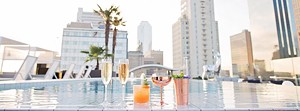
The Statler is a fine place to hang out, sure. But its also an iconic spot in Dallas music history.
Courtesy of The Statler
Showco
8204 Elmbrook DriveBefore today’s pop stars could swallow stadiums with expensive lighting rigs and visual effects to rival Hollywood blockbusters, Showco helped pave the way. What began as a provider of top-tier sound equipment — Jack Maxson, Rusty Brutsche and Jack Calmes formed the company in 1970 — evolved into a key supplier for the boom in arena rock concerts in the 1970s and beyond. The company was acquired by Clair Global in 2000, and its original Dallas location (above) has since closed.
Dallas International Guitar Festival
Dallas Market Hall, 2200 N. Stemmons FreewayGuitar shows, where aficionados gather to trade licks, admire axes and wax rhapsodic about riffs, were not a thing prior to 1978, when Charley Wirz, John Brinkmann and Danny Thorpe founded the three-day Dallas International Guitar Festival. From its humble origins in the basement of a Dallas hotel (whose name has, apparently, been lost to the mists of time) to its takeover of the sprawling Dallas Market Hall complex, the event blends sales and performance, and has been imitated — but never duplicated! — the world over.
AT&T Stadium
1 AT&T Way, ArlingtonFrom the moment Jerry Jones’s billion-dollar sports palace opened its doors in 2009, everything about concerts at AT&T Stadium has been larger than life. Multiple A-list acts from U2 to Paul McCartney to Post Malone to Metallica have performed at the stadium over the last 15 years, and one of them — country icon George Strait — even set a record, on June 7, 2014, for the largest indoor concert audience in the United States (104,793 attendees).
Sons of Hermann Hall
3414 Elm St., DallasThis unassuming Dallas landmark, perched at the east end of the Deep Ellum neighborhood, has stood sentinel for over a century. In that time, a space — the oldest free-standing wooden structure in the city of Dallas — once intended for public meetings and gatherings has become an intimate music venue, hosting countless musical acts: Robert Earl Keen, the Dixie Chicks, Whiskeytown, Wilco, Old 97’s and many more have taken a turn on the cozy stage.
Jacksboro Highway
Roughly from downtown Fort Worth to Lake Worth, along Highway 199Although the entirety of Jacksboro Highway looms large in the mythos of Fort Worth’s history, a particular three-and-a-half-mile section, known as “Thunder Road,” is where much of the history was made. (According to the Texas State Historical Association, “Thunder Road” contained no less than “18 restaurants, six liquor stores, seven nightclubs and 10 motels.”) The Skyliner Ballroom played host to Louie Armstrong, Jimmy Reed, Delbert McClinton and Ike and Tina Turner, who released recordings made at the Skyliner in the mid-1960s.
Dealey Plaza
411 Elm St.While Dealey Plaza is more closely associated with the assassination of President John F. Kennedy in 1963, the infamous spot just outside downtown Dallas also has ties to the music world. Erykah Badu created an uproar with her provocative video for her single “Window Seat,” which she filmed in a single take on March 17, 2010, slowly stripping all of her clothes off before pretending to be assassinated and collapsing onto the cement.
Record Town
120 St. Louis Ave., No. 105, Fort WorthThe second-oldest record store in North Texas — opened in 1957 by Kathleen and Sumter Bruton, just one year after Top Ten Records — this Fort Worth institution has long been a haven for musicians and fan alike, selling vinyl, CDs, cassettes and musical instruments. The Bruton family maintained its stewardship of the store until 2018, when ownership changed hands to the team of Bill Mecke and Thomas B. Reynolds.
Crystal Springs Dance Pavilion
5336 White Settlement Road, Fort WorthTrace the genre of Western swing back far enough, and you’ll wind up here, at a mostly forgotten dancehall on White Settlement Road. (Well, in your mind, anyway: The building was razed by fire in 1966.) Opened in 1916 by “Papa” Sam Cunningham, according to the Texas State Historical Association, the honky-tonk would eventually incubate stars like Bob Wills and Milton Brown, whose fusions of jazz and country gave the state, the country and the world a whole new kind of yee-haw.
Modern Electric Sound Recorders
4141 Office ParkwayIt all began with advertising. What is now Modern Electric Sound Recorders was built in 1968 (the building was first constructed seven years earlier, by the Production, Advertising and Merchandising Service, a renowned jingle production company) and was modeled on similar West Coast spaces of the era. The gear and the vibe remain steadfastly old-school — Modern Electric’s motto might as well be “if it ain’t broke, don’t fix it” — even under current owner-operator Jeffrey Saenz.
Granada Theater
3524 Greenville Ave.For the Granada Theater’s first 30 years, movies were the focus, not music. Opened in 1946 as a first-run movie house, the Granada was converted to a 1,000-capacity concert space in 1977 (it shifted back to movies not long afterward). Current owner Mike Schoder took over in 2004, reorienting the focus to music, where it has been ever since. A 2020 renovation restored the Granada’s luster and brought the Art Deco beauty of the interior back to full flourish.
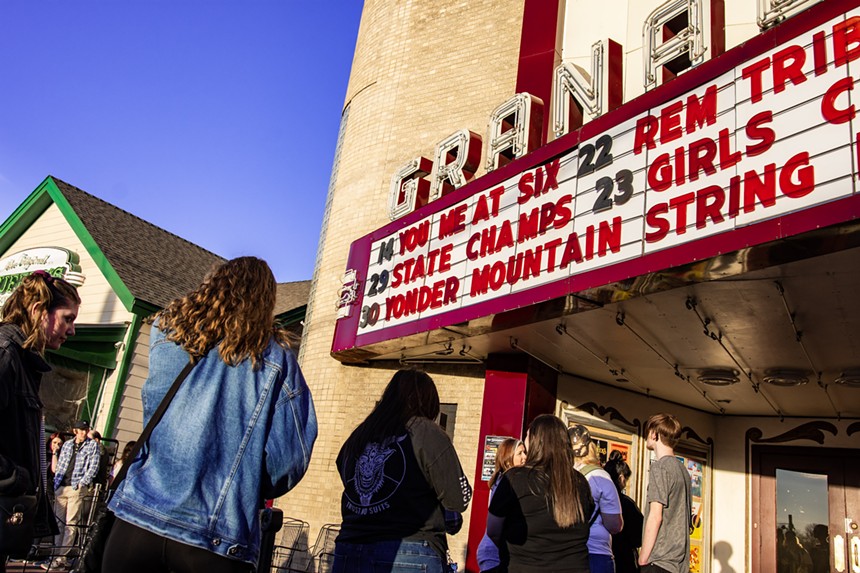
The Granada is an ideal place for a rocking first date and a great place to learn about local music.
Carly May Gravley
Balcony Club
1825 Abrams Road, Suite BWhen the Lakewood Theater opened in 1948, what would become the Balcony Club was just a closet. Over the years, however, through lean times and prosperous ones, this intimate East Dallas hub of live music, which began in earnest in 1988, has endured. It has become one of the best spots in town to see jazz music of an exceptionally high caliber.
KNON
13154 Coit Road, No. 200This noncommercial radio station, which went on the air over 40 years ago, has remained a crucial lifeline for the North Texas creative community, connecting listeners with the artists making music across a panoply of genres. Everything from zydeco to rockabilly to rap to folk to indie rock can be heard on KNON (89.3 on your FM dial, or streaming at knon.org), and the station has even withstood a 2019 tornado.
Panther Hall
E. Lancaster Avenue at Collard Street, Fort WorthFort Worth’s Panther Hall, opened in 1963, looms large in the region’s history, not least because it was the home of Cowtown Jamboree, a weekly country music performance show aired locally in the 1960s on the local CBS affiliate. Willie Nelson famously cut a live album there in 1966, and plenty of other Nashville luminaries (Buck Owens, Johnny Cash, Dolly Parton, Lefty Frizzell and Loretta Lynn, to name a few) made appearances. The venue was demolished in 1979, and the land where it sat now belongs to Texas Wesleyan University.
White Elephant Saloon
106 E. Exchange Ave., Fort WorthAn anchor in Fort Worth’s notorious “Hell’s Half Acre,” the White Elephant Saloon opened in 1884 and would exist in some form or fashion for the ensuing 140 years. Currently owned by chef and restauranteur Tim Love, the White Elephant has been a ritual stopping place for Texas country artists and singer-songwriters over the years, continuing the tradition of connecting the city to its rural roots.
The Studios at Las Colinas
6301 Riverside Drive, IrvingThe public can’t access what was once the Studios at Las Colinas these days — right-wing firebrand Glenn Beck purchased the entirety of the space in 2013, rechristening it Mercury Studios — but it remains a touchstone for Texas music because of a little program once filmed there in the early 1990s. Barney & Friends featured a then-unknown actress, Selena Gomez, who would go on to achieve pop music stardom.
Arlington Music Hall
224 N. Center St., ArlingtonWhat began life as a movie theatre, when it opened in 1950, gradually found a second life as a music venue, particularly under the ownership of Johnnie High, whose eponymous country music revue was a launching pad for future stars like LeAnn Rimes. Other country greats who performed at the Hall during High’s tenure include Willie Nelson, Wynonna Judd, and George Jones. High sold the Hall to Burk Collins in 2008, and the venue continues to operate today.
Levitt Pavilion
100 W. Abrams St., ArlingtonPart of a nationwide network of Levitt Pavilions, this is the only one to be built from scratch. Opened in 2008, with a performance from Brave Combo, the Pavilion has drawn thousands to downtown Arlington and presented an array of top talent including Ray Wylie Hubbard, Asleep at the Wheel, Pure Prairie League and Betty Buckley. Pentatonix set the attendance record for the venue in 2012, when an estimated 12,000 people watched the quintet perform.
James Martin High School
4501 W. Pleasant Ridge Road, ArlingtonIt was on the grounds of this high school that Pentatonix, one of the biggest pop groups of the last 20 years, formed. Kirstin Maldonado, Scott Hoying and Mitch Grassi grew up in Arlington together (Maldonado was born in Fort Worth; Hoying and Grassi hail from Arlington) and while attending Martin High School, sang an acappella version of Lady Gaga’s “Telephone” that caught attention on YouTube. Not long after, what would become Pentatonix was born.
The Bagdad Supper Club
Near Bagdad Road and State Highway 180, Grand PrairieYou can’t visit this particular building anymore — it burned down to the ground in 1953 — but this Grand Prairie venue opened on Thanksgiving Day 1928 and played host to multiple big bands of the era (such as Phil Phillips and His 14 Californians and Gus Heilig and His Orchestra), even being featured in the 1947 motion picture Juke Joint. The club was closed in 1950.
Josey Records
2821 Lyndon B. Johnson Freeway, No. 100, Farmers BranchYou can’t miss Josey Records, just off Interstate 635 in far north Dallas — it’s one of the largest independent record stores in the country (a gobsmacking 25,000 square feet of records and more awaits you). But apart from what feels like a month’s worth of crate digging, Josey is also home to the entirety of Bill’s Records’ inventory, the life’s work of the late, great Bill Wisener. If you want to plunge yourself into the past and understand the full scope of popular music over the last 40 years, get thee to Bill’s Records.
Poor David’s Pub
1313 Botham Jean Blvd.A rite of passage for any Texas singer-songwriter of consequence — just ask Lyle Lovett, Jerry Jeff Walker, Maren Morris, Miranda Lambert or Delbert McClinton — is a headlining gig at Poor David’s Pub, which has endured just outside of downtown Dallas for more than four decades. Watched over by David Card, the owner and operator, this intimate listening room puts audience and artist in close proximity and lets the magic happen.
Club Dada
2720 Elm St.Decades have passed, but the funky, creative Club Dada has endured. A pillar of the Deep Ellum community that opened in 1986, Club Dada has hosted a wide swath of local and national talent on its stage — everyone from Grizzly Bear and Big Freedia to Sturgill Simpson and Khruangbin have performed at the venue.
The [Bomb] Factory
2713 Canton St., DallasAs with so much else in Deep Ellum, the Factory (known as the Bomb Factory before a 2021 name change) opened in the 1910s and served as part of the U.S. war production effort during World War II, when it was owned by Henry Ford. The factory idled in the 1970s, until it was revived in 1993 for a four-year run. The Factory was awakened a second time, in 2015, with an Erykah Badu and Sarah Jaffe performance, and it has remained active since.
Rubber Gloves Rehearsal Studios
411 E. Sycamore St., DentonWhat Rubber Gloves Rehearsal Studios lacks in size it more than makes up for in both spirit and impact on the Denton music community. A blend of indoor and outdoor stages, as well as — as it says in the name — rehearsal space, Rubber Gloves has played host to a range of essential indie acts: Modest Mouse, Jimmy Eat World, At the Drive-In, The Get Up Kids, Boris, The Melvins and many more have crammed into the cozy space.
Cotton Bowl Stadium
3750 The MidwayPerhaps better known for its association with the Texas State Fair and the annual Red River Rivalry football game between Oklahoma and Texas, the Cotton Bowl has also hosted its fair share of mammoth live music events, with everyone from Elvis Presley and Elton John to the Rolling Stones (seven times, most recently in 2021) and Karol G taking over the space. The Cotton Bowl was also home, from 1978 to 1986, to the Texxas Jam, an annual bacchanal of guitar rock.
North Forty
130 E. Exchange Ave., Fort WorthIt’s not much to look at on most days, but the vast expanse of land just behind Billy Bob’s Texas has been the site of some of the biggest musical events North Texas has ever seen. Willie Nelson has hosted his famous Fourth of July Picnics there seven times, beginning in 2004 (drawing 20,000 attendees), and Cross Canadian Ragweed staged its own Red Dirt Festival there a few times.
Fort Worth Stockyards
160 E. Exchange Ave., Fort WorthThe Stockyards is an indelible part of Fort Worth’s identity, and music is deeply embedded in the area. The many venues scattered throughout range from cozy bars to the large-scale honky-tonk that is Billy Bob’s Texas. From rock to country to cumbia, the melting pot of Texas music is on vivid display almost every night in the Stockyards, one of the few spots in North Texas where there’s something for just about every musical sensibility.

